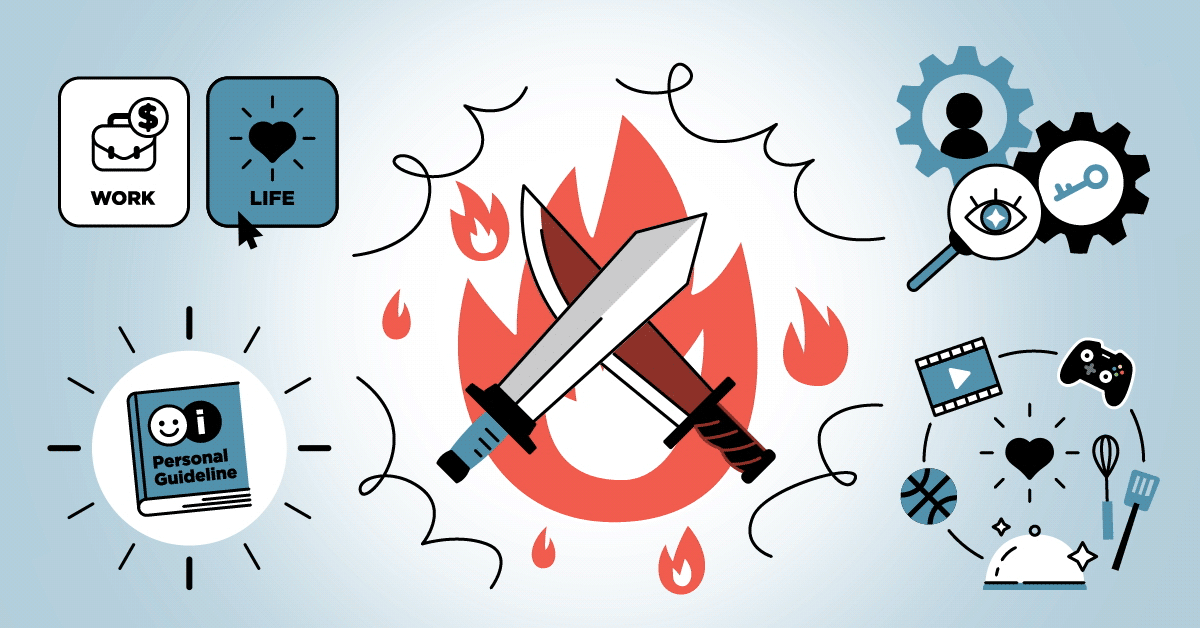
Burnout is a serious problem that’s only increasing in corporate spaces. We’ve shared before about how the responsibility of fixing burnout in an organization doesn’t fall on the worker, but sometimes you have to take matters into your own hands.
If you’re experiencing undue stress in your working role, it’s time to take action and take control. Here are four ways for you to combat anxiety before it turns into burnout.
1. Consider Your Priorities
This sounds simple but it’s a foundational step in finding more meaningful work. You most likely have the answer you’d use in an interview; “Work is my life!” But is that the truth? It doesn’t have to be. Prior to previous cultural beliefs, you don’t have to dedicate your entire life and personality to your position.
More and more people are changing their attitudes around work, to the degree that Dr. Chris Mullen says work-life balance is over; we are entering a stage of work-life negotiation. “It can be easy to replace the phrase work-life balance with work life negotiation in our vocabulary,” he said in an article for Forbes, “But if we are truly to embrace the idea of worklife negotiation as leaders, we must be willing to disrupt ourselves in order to overcome really basic obstacles that will unlock a world of possibilities for our workforces.”
You might not have a leadership team with that point of view, but you can still adopt it as an individual. It’s time to be honest with yourself and assess your priorities; what do you want to matter in your life? Where does work fall in your personal ranking of importance in your life?
2. Unplug Thoroughly

This point of advice seems to be something everyone agrees will be helpful, but very few actually follow through on. The lines between work and home will continue to erode because of email, texting, calls and work chat platforms. It’s up to you to draw a firm line and keep that boundary.
So how do you do that? Develop strict personal guidelines and stick to them! Set your working hours in accordance with your organization and stick to them. Working past these guidelines can feel inevitable, but really focus on your time management and invest in yourself.
If you work a late night or a few hours on a weekend, reclaim that time in your following days and put aside time for yourself. Make sure to use all of your vacation time and sick time, every year (don’t forget that you can take mental health days!). Also try to avoid having work email, chat, and schedule notifications on your phone, unless you have a work phone.
Depending on your place of work, this might cause a rift in expectations versus execution. If your organization has a hustle culture, consider if that’s something you want. (Go back to the values you just explored for guidance!) If the cultural expectation is dedication past what you want to invest, look for another position. There’s nothing wrong with holding firm on boundaries and finding a good fit.
3. Ask For Opportunities
Another way for you to fight against burnout is to make your work more meaningful to you personally. Depending on your position, that’s going to look different, but very few workplaces will turn down an employee asking for more opportunities.
It’s time to make those opportunities work for you! See if your organization can pay for you to attend conferences, trainings, or any kind of extra education to improve your skills.
Present this ask as the ‘win/win’ it is— the additional training will boost your resume, make you more qualified in your position, and hopefully engage you more in your day to day work. The benefits to your organization are the development of their talent pipeline while getting a more qualified worker without the additional expenses of onboarding.
4. Invest In Your Hobbies

You can work to live, not live to work! Make sure to have hobbies outside of work. The idea is to find a way to take more pleasure in your everyday life outside of your job by grounding yourself in experiences. Joining a team sport, creating art regardless of your skill level, and spending time in nature will all improve your mood and general wellness.
If you’re already burned out, taking on more tasks or experiences might be overwhelming, so start small. A walk around the block, taking special care while listening to a new or favorite album, and being mindful while cooking are all good places to start.
Ask for a wellness committee at your workplace and try to incorporate joy into your workplace— can you lead a workshop on a hobby? Organize a company outing? Find a way to make that hobby support charity work?
Getting more involved like this will deepen your workplace relationships and help your organization demonstrate their commitment to employee well being. It also can remind everyone involved that there’s more to life than business and tasks. This refocus on the things that make life worth living will do wonders for reducing stress.
Move Forward and Beat Burnout
Burnout doesn’t need to be a foregone conclusion. Taking these steps to protect yourself in the workplace will help you maintain perspective, find work that aligns with your values, set boundaries, and create a meaningful, joyful life, inside and outside of your working role.
Do you want to learn more about yourself? Do you think your organization would benefit from using assessments to reveal human potential? Contact us here.




